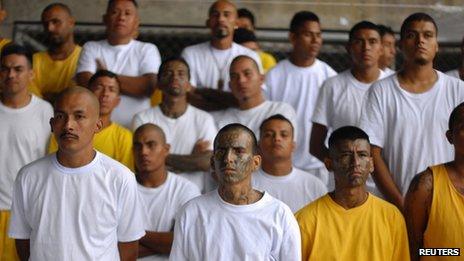El Salvador murders drop as gang truce passes 100 days
- Published

Ceremonies were held in prisons holding gang members to mark 100 days
Murders in El Salvador have dropped from about 14 a day in March to five, as a truce between the country's powerful street gangs passed 100 days.
Police said that overall this year killings had fallen nearly 24%, while murders in May were down by more than 50% on the same period last year.
The gangs, Mara Salvatrucha and Barrio 18, agreed a halt to hostilities, in a deal brokered by the Catholic Church.
El Salvador's street gangs have a reputation for ruthless violence.
Announcing the latest crime figures, Justice and Public Security Minister David Munguia Payes said that the truce between the gangs "has had an important effect on the drop in violence".
The deal between the Mara Salvatrucha gang, also known as MS-13, and Barrio 18, came about after their leaders were moved from maximum security jails to more relaxed conditions.
Jobs
President Mauricio Funes has stressed his government did not negotiate with the gangs but merely facilitated the accord.
Imprisoned gang members held ceremonies on 19 June to mark the first 100 days of the accord.
Gang leaders indicated they were ready for talks about making the peace pact permanent, the Associated Press reported.
"We want a definitive ceasefire," one leader, Oscar Armando Reyes, told AP. But he said the government had to come up with concrete proposals on jobs.
El Salvador's gangs have their roots in the immigrant street gangs of the US.
Over the years they have grown to become powerful, trans-national criminal organisations with thousands of members.
The truce has attracted the attention of neighbouring countries, Honduras and Guatemala, which also suffer high murder rates and gang violence.
- Published9 September 2010